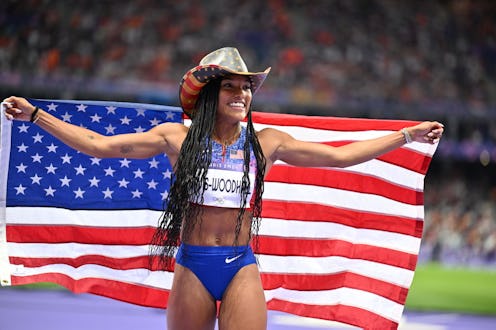Bustle Exclusive
Tara Davis-Woodhall & Dove Want Natural Hair Representation In Emojis
The Olympic athlete has partnered with the personal care brand to call for change.

Tara Davis-Woodhall is used to being seen. As an Olympic gold medalist, her name is known around the world, as is her face. But when it comes to digital spaces — such as her emoji keyboard — she, like so many others, is still searching for a way to fully show up as herself.
“I was shocked — not surprised, but shocked — that we’re not represented,” Davis-Woodhall tells Bustle, reflecting on the lack of emojis that reflect natural Black hairstyles. “Afro hair texture is not represented in emojis, and I change my hairstyle pretty much monthly.”
That absence is exactly what Dove and youth empowerment organization RISE.365 are hoping to change with their Code My Crown campaign. Together, they’re calling on the Unicode Consortium — the nonprofit that decides which emojis make it onto your keyboards — to introduce four new icons that reflect Black hair textures and styles: afro, braids, locs, and cornrows.
It’s a campaign backed by new research from Dove, which found that eight in 10 Black people in the U.S. either can’t find an emoji that represents their hair — or don’t bother looking, because they know it doesn’t exist. “If I had an emoji to represent each hairstyle I had,” the Olympic star shares, “my Instagram would be even more popping.”
The Call For Digital Representation
Emojis have been baked into the world’s digital culture for quite some time, and statistical data from Unicode in 2021 reported that 92% of the world’s online population uses them.
With an emoji keyboard that depicts little to no diversity across ethnicities, the margins of who gets to feel represented close in.
“I just want to be seen for who I am,” Davis-Woodhall says. “And this feels like a perfect way to do that.”
Reflecting on her experience of scrolling through her phone and seeing the same limited options, she notes how straight hair, ponytails, and other styles are given a digital platform. “I see all these cute emojis with pigtails and straight hair. And I’m like, ‘What about me? Why do I have to keep fighting to find something that represents me?’”
For many, emojis might seem like a fun little detail you quickly text friends without thinking twice. But the reality is that it’s another reminder of how Black identity is too often overlooked — even in the smallest, most everyday spaces.
When she posted about the campaign on Instagram, the comments poured in. “So many of my white friends were like, ‘I didn’t even notice that,’” she said. “And I’m like, yeah, we notice it every time.” But there was something powerful in that moment, too — people learning, paying attention, and using their own voices to show support. “They started going to Dove’s Instagram and commenting with #CodeMyCrown. It felt good to have people realize this is a thing.”
Tara’s Hair Journey Is Still Evolving
For Davis-Woodhall, her hair story is still being written, and she admits it’s still one she’s learning to fully accept.
“I used to relax my hair. I never even saw my actual curls until I was 21,” she says. “Now I switch between braids, sew-ins, and my natural hair. But I’m still not always confident. Some days, I still hide it.”
It’s for these reasons that she doesn’t take representation lightly. “Being part of this campaign is helping me to show up as me.” She remembers the first time she posted a photo with her natural curls. “It was honestly empowering. A little scary, but freeing. The comments, the support — it made me want to wear my hair like that more.”
Even during competitions, her hair is on her mind. “I’m always in braids. It’s hot, I’m sweating, I don’t want to damage my hair by straightening it all the time,” she says. “But even then, I’m thinking, ‘Is my track showing? Does it look okay?’ I shouldn’t care, but I do.”
But she’s learning to give herself more grace every day, and she hopes you do too. “I wish I had learned earlier that it was OK to look like me,” she shares. “Now, I’m so glad I do. I’m beautiful in my own way. And if someone else doesn’t think so? So be it.”